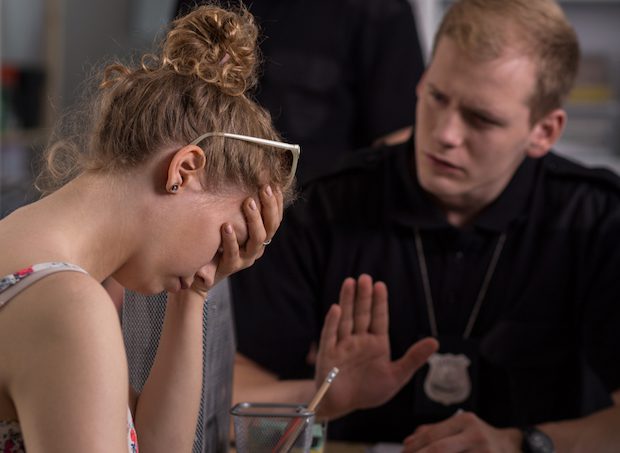Cop Land, Teacher Nation

A reader’s response to the “Cops Can’t Be Our Saviors” post:
I work in a police department in California (as a civilian) and my wife is a professor at a local community college. We both see a lot of what you talk about.
One of my common refrains to people outside of law enforcement is that cops are just people. Yes, there are some extraordinary cops (such as Chief Brown in Dallas) just as there are extraordinary soldiers, nurses, teachers, bus drivers, and American Conservative Writers. But being a cop or a teacher or a bus driver or an American Conservative Writer doesn’t make you extraordinary. You’re going to have a mix of exemplary, terrible, and just average.
With that in mind, the types of tasks given to law enforcement are often outside of the realm of their core competency – or at least what people believe their core competency to be.
When I first started at my department (some 13 years ago), I went on a ride-along with one of the officers. At the time, there was some pressure from coworkers to enroll in the academy and become a cop. I figured this was a really good look at what they do every day.
After half a day, I was done. I could easily tell that years of doing THAT job would break something in me. It would rob me of my optimism and faith in people (though just age has done a lot of that too). It wasn’t that I saw cops being disrespected or criminals flouting the law. It was going along on a domestic disturbance call to see a woman and her daughter who were fighting because the daughter had just found out she was HIV positive and was threatening to kill herself while her mother berated her and bemoaned the fact that she was doing drugs and “prostituting herself” (I’m not clear on whether she meant literally, but that was the impression I got).
After that call, I knew I couldn’t do the job. The calls I went along on that were criminal – those were fine for some reason, but the fact that peace officers were being asked to mediate this type of intensely personal and intimate problem smacked me in the face.
If you want a broader example of police being asked to work in their communities in ways that are an unfair burden, ask how your city handles the homeless. I guarantee you that in almost every city the agency doing the most work with homeless is the local police department. If there was ever an argument for the fact that we’ve criminalized poverty, it is probably that. More than half of the staff meetings I sit through are filled with debates and reports on how the department is handling the homeless. This is a complicated social issue that requires compassion and well-thought-out policy, but instead is being thrown over the fence to law enforcement to figure out. And the drive isn’t to help these people, it’s to ensure the City Council members that people won’t see vagrancy in their fair city because it’s bad for business. In the face of such work, it’s hard to not understand how so many officers’ hearts harden. They have to to be able to cope.
The same is very true of teachers. As I said, my wife teaches at a community college. She teaches English from the Honors Level to the “you probably shouldn’t have been allowed out of High School” level. Some of the stories she brings home just break your heart. Students come to her for help because they’re being abused at home, because their families throw them out of the house for going to class instead of opting to “help the family” by staying home to watch siblings – so much of it again driven by poverty traps and the chaotic values that the younger students swim in. These students often feel completely out of control over anything in their lives and don’t know how to assert control. I’d say a good half of my wife’s work with students in non-transfer level classes is educating them on how to function as an adult in society and as a student paying for college than actual reading and writing.
And there are traps for the middle class as well, of course. In the desperation to not fall into the lower class, parents want to ensure that their kids have activities and schedules and demand more and more of the systems around them to buoy their children against potential class slippage. Add to that the fact that what is considered a “middle class” lifestyle today almost presupposes a dual-income household, which means expensive child care where we literally end up outsourcing a significant amount of the child-rearing, as my wife and I are set to do once her semester starts. Not to say that people shouldn’t use daycare, but rather that the fact that these days it’s almost required to use one establishes the pattern of “someone else is responsible” pretty early on in the lives of our children, and if we aren’t vigilant against it, we allow that attitude to infect us; seep through us and into our kids.
All of these issues are intertwined. The lack of community creates a dearth of social support structures that we used to be able to depend on, so people start leaning on institutions that were never meant to provide that type of support, and those institutions bend and creak and eventually will break because of it.